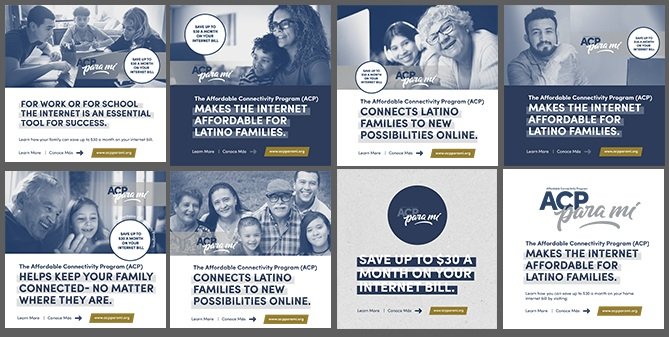ACP Para Mi - National Latino Organizations Continue to Address Ongoing Digital Divide
HTTP is ecstatic to announce the updated launch of ACP Para Mi, their ongoing, national campaign to address the internet affordability gap and digital divide. Since the inception of the Emergency Broadband Benefit, HTTP has provided culturally relevant and in-language materials to national advocacy partners to encourage Latino Families to enroll in these programs.
ACP Para Mi will continue to be a bilingual resource hub for Latino households and community advocates to support low income households looking to subscribe to at-home broadband for the first time. “ACP Para Mi” helps Latino families navigate the enrollment process and the tools necessary to help find an internet service provider and a service plan that meets their family's needs and budget.
HTTP is especially excited to continue in this effort to bring affordable internet to Latino households in conjunction with recent initiatives from the White House and NTIA. The Biden-Harris Administration, along with their Republican and Independent counterparts in Congress, have fortified the Affordable Connectivity Program (“ACP”), ensuring that low-income households can afford the broadband internet they need for work, school, healthcare, and more.
Through the getinterenet.gov initiative, the $30 monthly ACP benefit can also be coupled with one of the 20 internet service providers who are committed to bringing ACP-eligible households a high-speed plan for no more than $30 per month, meaning families can access high-quality internet at no cost. HTTP has outlined the eligible providers for families with its national partnership, ACP Para Mi. These partnerships include three of the largest carriers across the country who are offering the ACP benefit in most states and territories including, AT&T, Verizon, and Xfinity. Find all 20 providers, eligibility requirements, frequently asked questions, along with community resources on our bilingual pages ACPParaMi.org.
The benefit provides a discount of up to $30 per month toward internet service for eligible households and up to $75 per month for households on qualifying Tribal lands. Eligible households can also receive a one-time discount of up to $100 to purchase a laptop, desktop computer, or tablet from participating providers.
HTTP continues to uplift and work with programs like the ACP as well as the BEAD Program, which has recently opened to the states, in addition to the Digital Equality Acts Program. HTTP embraces these infrastructure initiatives as Hispanics are disproportionately represented in the digital divide, where only 65% have broadband access at home and over a quarter of all Hispanics only have access to the internet through their smartphones, lagging behind other groups.
The FCC also has committed to closing the “homework divide” by dedicating 50 million dollars to the Emergency Connectivity Program. Chairwoman Rosenworcel said that “With help from the Emergency Connectivity Fund, millions of students across the country now have online tools to support their education.”
The digital divide continues to be problematic as it hinders the Hispanic community’s ability to navigate systems that are moving toward an “online-only” environment, spurred by COVID-19. The divide stunts productivity in searching for work and completing educational endeavors.
Thus, the initiatives outlined at getinterenet.gov and interenetforaall.com to provide universal access to high-quality internet are greatly welcomed and a good start. We are encouraged by these steps while also continuing to provide accountability and coordination in order to close this digital divide. HTTP continues to uplift and work with our coalition and partners who provide digital skills training, tech centers, work-force development and access to devices needed to foster upward mobility through education, health, and economic growth in our communities.


